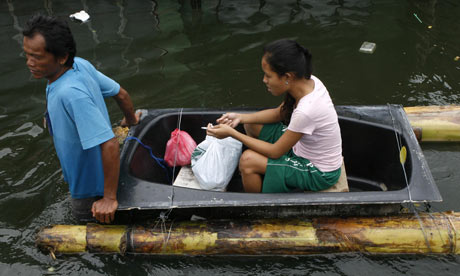
Post-Storm Conditions In Philippines Continue To Threaten Health
guardian.co.uk
Monday, October 26, 2009
Filipinos are "struggling to live in flooded suburbs or crowded shelters one month after devastating rains began pounding the Philippines, and officials warn no quick fix is in sight," Agence France-Presse reports. According to the WHO, 1.43 million people, "mostly in and around Manila, continue to endure a dangerous existence living in flooded districts" (Morella, 10/26).
Diseases are rampant in flooded areas and evacuation centers, according to health officials who are especially concerned about the bacterial infection leptospirosis. "[D]engue fever, malaria, diarrhea, skin rashes and other illnesses are [also] common. Of the 35,000 people in evacuation centers, more than half suffer from some disease, most commonly acute respiratory illness, according to the Department of Health," the New York Times reports. "Efforts to relocate survivors have had limited impact because of the refusal of some affected residents – many of them slum dwellers whose shanties were destroyed – to be uprooted from their communities. According to the government, more than 1.2 million residents still live in damaged villages in greater Manila, some of them with waist-high floodwater."
Diwa Gacosta, a local representative of World Vision, said crowded and unsanitary conditions were fueling the spread of disease. "The impact of the flood to children’s health is really a problem," Gacosta said. "'Children in these storm-affected areas face a host of dangers that pose a threat to their very survival,' said Latha Caleb, the director of Save the Children in the Philippines. 'It is critical now to address the lack of sanitation systems and clean water that are resulting in widespread illness and disease,'" the newspaper writes (Conde, 10/25).
According to TIME, the WHO's Global Outbreak Alert and Response Network is sending medical assistance teams to Manila "to evaluate the government's response in tackling the disease, and draw up recommendations for future large-scale leptospirosis outbreaks, said Eric Tayag, head of the Department of Health's National Epidemiology Center." The country's "overstretched and underfunded public health system is poorly equipped to deal with large-scale disease outbreaks, even for diseases like leptospirosis that are seasonally common across the archipelago," the magazine writes. "Several large government hospitals were damaged in the flooding, and have struggled to cope with the influx of patients. A week after [Tropical Storm] Ketsana, much of Pasig General Hospital was under water, including its laboratory" (McIndoe, 10/26).
On Friday, Josette Sheeran, executive director of the U.N. World Food Programme (WFP), said the Philippines is facing its most challenging humanitarian crisis in recent history, IRIN reports. "The agency is providing 'critical' food support to more than one million of the eight million people hit ..." by the storms. The article includes comment from another WFP official and examines how the country was preparing for Typhoon Lupit (10/23). By Saturday, Typhoon Lupit had been downgraded to a tropical storm and veered away from the Philippines, AFP reports (10/24).
U.S. Pledges $8.5M In Food Aid To Philippines
On Monday, the U.S. announced it would provide food $8.5 million of food aid to the Philippines, Deutsche Presse-Agentur/Monsters and Critics reports. "U.S. Agriculture Secretary Tom Vilsack, who was in Manila on a four-day trade mission, said the donation (.pdf) would provide food to 438,000 people for 60 days" (10/26).
"Philippine Press Undersecretary Anthony Golez said in a news briefing that the U.S. agriculture department, through its Food for Progress Program, will be donating 7,000 metric tons of rice and 680 metric tons of nonfat dry milk to the victims of typhoons Ketsana and Parma," Xinhua writes (10/26).
The Kaiser Daily Global Health Policy Report is published by the Kaiser Family Foundation. © 2009 Henry J. Kaiser Family Foundation. All rights reserved.




